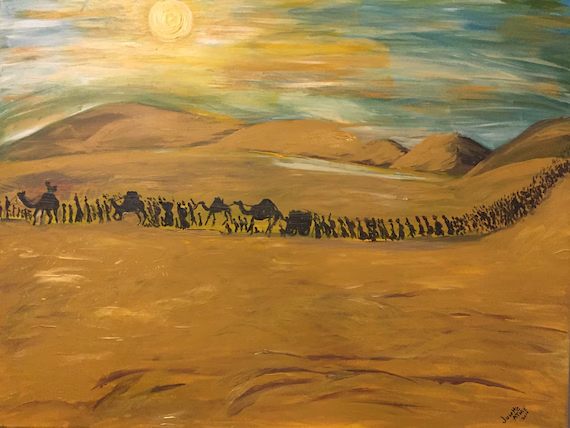Jacob and Rachel
Jacob walked alone for many days until, at last, he reached the land where his mother's family lived.
He stopped at a well to ask some men with flocks of sheep if they knew his uncle Laban. 'Yes, they replied and here comes his daughter Rachel, to water her sheep at the well.
Jacob was overjoyed to meet Rachel. He told her who he was, and helped her to water the sheep. Then she ran home to her father, Laban.
When Laban heard that Jacob was at the well, he ran to greet Jacob, and welcome him to his house.
Jacob stayed with Laban and worked for him for a month. Then Laban asked him what he wanted to be paid for his work. 'I'll work for you for seven years if you let me marry your younger daughter Rachel, said Jacob.
Laban agreed and Jacob loved Rachel so much, the seven years seemed to him to pass like seven days.
On the wedding day Jacob longed for Laban brought his elder daughter Leah, to marry Jacob. 'It's the custom in this country that the younger daughter can't be married, before the elder daughter, so you must marry Leah, he said.
Leah was a pleasant- looking girl, but it was the beautiful Rachel that Jacob loved. After the wedding, Laban agreed that Jacob could marry Rachel as well, but he would have to work for him for another seven years.
Jacob married Rachel: he now had two wives but his house wasn't a happy one, Jacob loved Rachel more than Leah, which made Leah unhappy.
As the years passed. Leah had six sons and a daughter, but Rachel had none, which made her unhappy. Then at last, she had her first son whom she called Joseph.
During all the years Jacob worked for Laban, his uncle had grown rich, with huge herds of cows and flocks of sheep and goats.
Now Jacob longed to go home to Canaan. 'Let me take my wives and children and go to my own country, he said to Laban. Laban didn't want Jacob to leave, but he said; 'What shall I pay you for all your work?
'I don't want money, replied Jacob. Instead let me take all the black lambs and speckled and spotted sheep and goats from your herds.
Laban agreed and Jacob and his sons sorted out the sheep and goats. Then Jacob, Leah, Rachel and their children packed all their possessions on camels and taking the sheep and goats, as well as their cows and donkeys, began their journey.
Jacob sent a message to his brother Esau, that he was on his way home. Then he heard that Esau was coming to meet him, with four hundred men. Jacob thought that this meant Esau was going to attack and kill him. He prayed to God for help.
Then he sent a servant with many of his goats, sheep, camels, cows and donkeys as a present to Esau. The rest of the flocks he sent across a river with his two wives and eleven sons, where he thought they would be safe. Alone and afraid, he waited for Esau.
That night, a man came and fought Jacob. All night they wrestled, without a word being spoken. Jacob didn't know who this stranger was, but he knew he came from God.
When the sun rose at dawn the man said; 'Now you must let me go. 'I won't let you go until you have given me your blessing, replied Jacob.
What's your name? asked the man. It's Jacob, said Jacob.
From now on, your name shall be Israel, said the man. He gave Jacob his blessing and disappeared.
In the morning light, Jacob saw Esau and all his men approaching in a great cloud of dust. Jacob bowed to his brother and waited, but Esau ran up to him, flung his arms around him and kissed him.
'Welcome home, my brother, he said and they both wept with joy at meeting again. All the old quarrels were forgotten.










Comments
Post a Comment